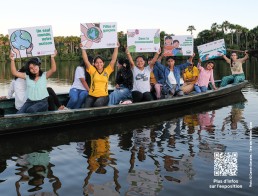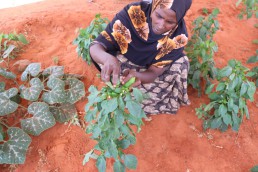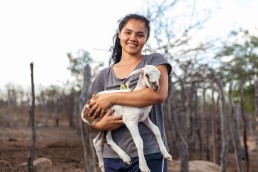Children's right to a clean, healthy and sustainable environment
1. Bolivia | Youth Eco-Reporters Campaign | Terre des Hommes Geneva

Picture of a poster for the photo exhibition in Geneva
Credit: Carmen Barrantes, Terre des Hommes Suisse
The Eco-Reporters project enables children and young people to become changemakers for a greener and more just world. As part of this learning experience, children and young people develop the skills to identify complex socio-environmental issues and communicate about them using journalistic tools such as photography and writing.
The participants interacted with environmental issues by going out in the field and experiencing first hand the challenges they wanted to raise awareness of. This methodology encouraged children to express themselves in the first person and to take initiative on choosing their topics, so that they became both the message and the messenger.
In Bolivia, over 140 children and young people took part in the workshops and wrote 139 reports, which were published in the annual magazine titled EcoReporters. The children chose topics that demonstrate how their right to a healthy, sustainable and protective environment is ensured through positive experiences such as reforestation experiences, recycling or bee-keeping, etc. or violated through issues like water pollution, air pollution or inappropriate waste management, among others. Several local newspapers covered the programme reaching a wide audience and mobilising local communities to protect their environment.
In addition, in October 2022 a photo exhibition was organised in Geneva entitled “Ici et là-bas les enfants s’engagent pour le climat.” or “Here and there children fight for a better climate” where several youth led projects were showcased.
The overall aim of the “education for sustainable development programme” is that children and young people live and grow up in healthy, nourishing and sustainable environments that respect their rights. Among the projects that make up this programme, the Eco-Reporters project was recognised as a success and will be scaled up beyond Bolivia in 2023.
Read more about scaling the Eco-Reporters project beyond Bolivia here.
2. Somalia | Solar energy to combat drought and hunger | Terre des Hommes Germany

Keyf Hussein, harvesting capsicum for her family of ten
Keyf Hussein (37) lives with her family of ten in the village of Dalsan in Somalia. Peppers, kale, spinach and watermelon thrive in her garden.
“My children love the watermelons!” she says.
Like most people in the region, Keyf’s family makes a living raising livestock and growing crops. But erratic and poor rainfall in recent years has caused wells to dry up.
Many animals have died of thirst, and fields have dried up. In the East African country, more than five million people are threatened by hunger.
Together with the local organisation NAPAD (Nomadic Assistance for Peace and Development), Terre des Hommes launched a project in the Gedo and Galgadud regions to improve water supply for the communities and nutrition of 2,500 households. To this end, solar-powered water supply systems have been installed in three communities.
Keyf Hussein has to water her garden in the morning and evening. The village’s well has not been able to provide the water for a long time. But thanks to the new technology, water can be pumped up from great depths, so there is enough water to supply livestock and vegetable gardens. At the same time, Keyf attended training sessions where she learnt how to adapt seeds and use suitable cultivation methods to cope better with water shortages. A total of 50 women participated in the project.
“Thanks to the training and the exchange with the NAPAD team, we can manage our vegetable gardens. I now have nutritious fruits and vegetables for my family,” she reports.
And what the family cannot consume themselves, they give away to their neighbours.
“We are very grateful for the project, through which we have learned this way of farming.” Keyf Hussein also has a wish for the future: “I hope to be able to grow more in the future and sell it at the market in Abudwak.”
Read more about the project here (in German).
3. Brazil | Sustainable Livelihood | Terre des Hommes Basel

Sustainable Livelihood project participant
Copyright: Tulio Felipe dos Santos Martins
The semi-arid region of Brazil covers twelve percent of the Brazilian territory with 27 million inhabitants. Recent studies show that the semi-arid habitat plays a prominent role in the regional and global carbon footprint.
In recent years, however, this region has suffered greatly from desertification, and it is precisely in this difficult environment that our partners Centro Sabiá and Agricultura Familiar e Agroecologia are working with young people in a training programme for sustainable and ecological agriculture. Here, they apply agro-ecological production models to live in harmony with the environment. Together, they promote the reforestation of semi-arid vegetation while growing vegetables, fruit and cereals in an agro-ecological way, without genetic engineering or chemicals. As a result, more than 17,000 semi-arid seedling species were produced by the youth in 2022 alone.
The young people are the heart of the projects. They are courageous and undoubtedly the main actors for food security and for mitigating the effects of climate change.
Due to the challenges of a dry climate, the production of crops relies on seasonal rainwater cisterns. As knowledge about water management is essential, the youth participants learn to manage smart irrigation systems and reuse water to supply their farms.
Within this small area, everything has been thought through in terms of agro-ecology: the drought-resistant cactus serves as fodder for the cows, which produce milk that is in turn processed into cheese. The dung of the animals is used as fertiliser and deposited in a biogas plant, which serves as gas for the family’s cooking. The seeds of vegetables, fruits and cereals are stored in a seed bank in the community, where they can be used for the next cycle. Nothing is wasted on an agro-ecological farm.
Read more about this project here.
